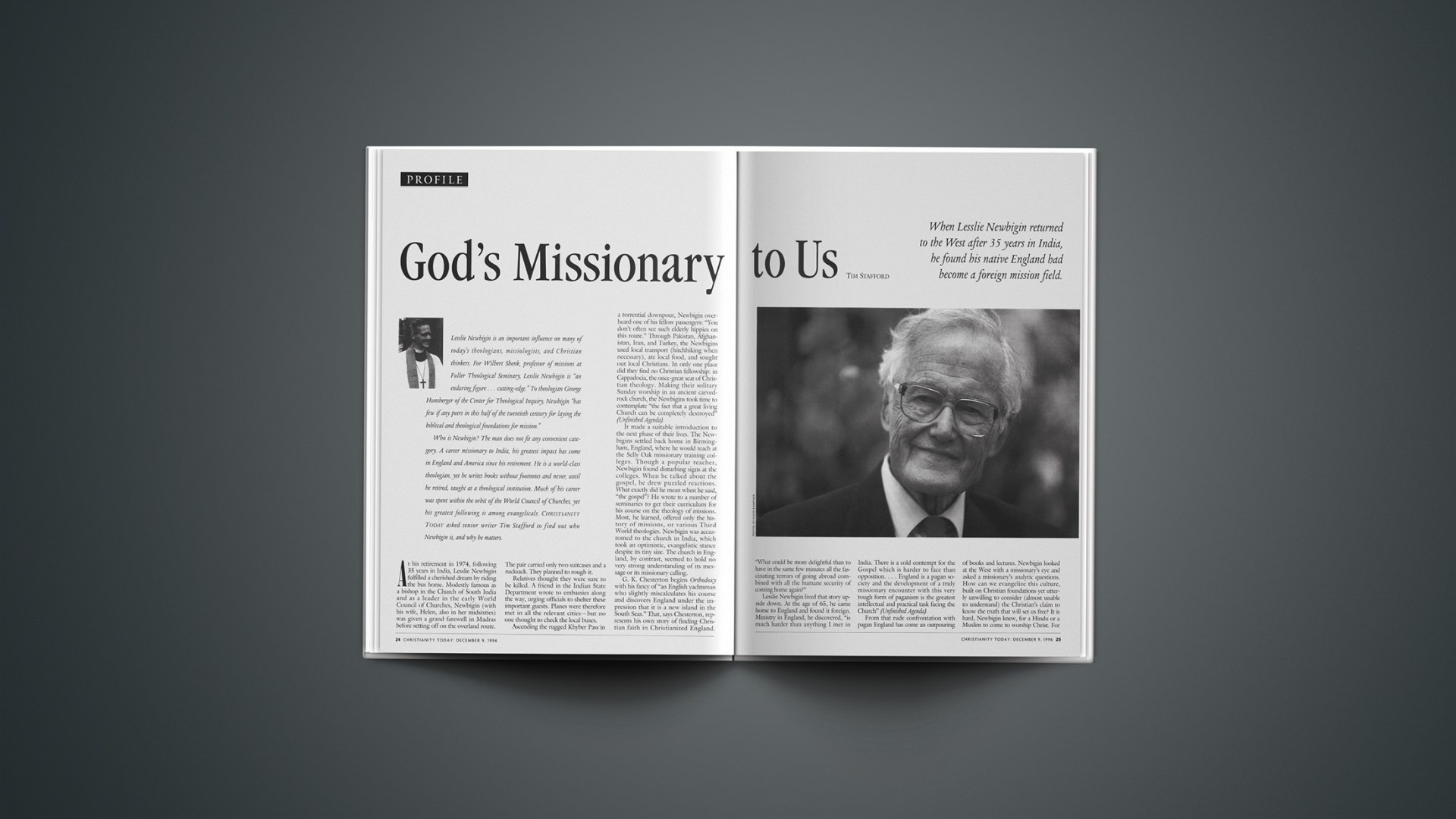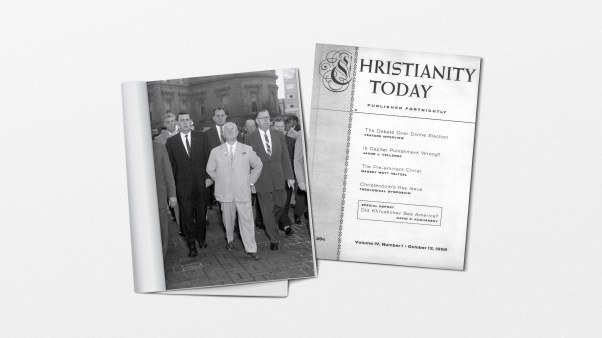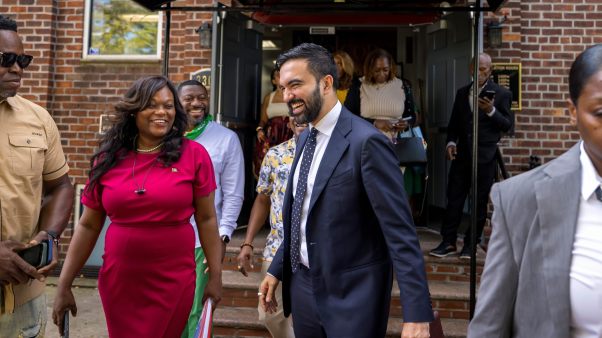Lesslie Newbigin is an important influence on many of today’s theologians, missiologists, and Christian thinkers. For Wilbert Shenk, professor of missions at Fuller Theological Seminary, Lesslie Newbigin is “an enduring figure … cutting-edge.” To theologian George Hunsberger of the Center for Theological Inquiry, Newbigin “has few if any peers in this half of the twentieth century for laying the biblical and theological foundations for mission.”
Who is Newbigin? The man does not fit any convenient category. A career missionary to India, his greatest impact has come in England and America since his retirement. He is a world-class theologian, yet he writes books without footnotes and never, until he retired, taught at a theological institution. Much of his career was spent within the orbit of the World Council of Churches, yet his greatest following is among evangelicals. CHRISTIANITY TODAY asked senior writer Tim Stafford to find out who Newbigin is, and why he matters.
At his retirement in 1974, following 35 years in India, Lesslie Newbigin fulfilled a cherished dream by riding the bus home. Modestly famous as a bishop in the Church of South India and as a leader in the early World Council of Churches, Newbigin (with his wife, Helen, also in her midsixties) was given a grand farewell in Madras before setting off on the overland route. The pair carried only two suitcases and a rucksack. They planned to rough it.
Relatives thought they were sure to be killed. A friend in the Indian State Department wrote to embassies along the way, urging officials to shelter these important guests. Planes were therefore met in all the relevant cities—but no one thought to check the local buses.
Ascending the rugged Khyber Pass in a torrential downpour, Newbigin overheard one of his fellow passengers: “You don’t often see such elderly hippies on this route.” Through Pakistan, Afghanistan, Iran, and Turkey, the Newbigins used local transport (hitchhiking when necessary), ate local food, and sought out local Christians. In only one place did they find no Christian fellowship: in Cappadocia, the once-great seat of Christian theology. Making their solitary Sunday worship in an ancient carved-rock church, the Newbigins took time to contemplate “the fact that a great living Church can be completely destroyed” (Unfinished Agenda).
It made a suitable introduction to the next phase of their lives. The Newbigins settled back home in Birmingham, England, where he would teach at the Selly Oak missionary training colleges. Though a popular teacher, Newbigin found disturbing signs at the colleges. When he talked about the gospel, he drew puzzled reactions. What exactly did he mean when he said, “the gospel”? He wrote to a number of seminaries to get their curriculum for his course on the theology of missions. Most, he learned, offered only the history of missions, or various Third World theologies. Newbigin was accustomed to the church in India, which took an optimistic, evangelistic stance despite its tiny size. The church in England, by contrast, seemed to hold no very strong understanding of its message or its missionary calling.
G. K. Chesterton begins Orthodoxy with his fancy of “an English yachtsman who slightly miscalculates his course and discovers England under the impression that it is a new island in the South Seas.” That, says Chesterton, represents his own story of finding Christian faith in Christianized England. “What could be more delightful than to have in the same few minutes all the fascinating terrors of going abroad combined with all the humane security of coming home again?”
Lesslie Newbigin lived that story upside down. At the age of 65, he came home to England and found it foreign. Ministry in England, he discovered, “is much harder than anything I met in India. There is a cold contempt for the Gospel which is harder to face than opposition. … England is a pagan society and the development of a truly missionary encounter with this very tough form of paganism is the greatest intellectual and practical task facing the Church” (Unfinished Agenda).
From that rude confrontation with pagan England has come an outpouring of books and lectures. Newbigin looked at the West with a missionary’s eye and asked a missionary’s analytic questions. How can we evangelize this culture, built on Christian foundations yet utterly unwilling to consider (almost unable to understand) the Christian’s claim to know the truth that will set us free? It is hard, Newbigin knew, for a Hindu or a Muslim to come to worship Christ. For an Englishman, it would seem, it had become even harder.
A pain in the mindOne day in 1979, a 70-year-old Lesslie Newbigin found himself substituting as chair of his denomination’s (the United Reformed Church’s) local council. On the docket was the demise of a 120-year-old slum church across from the gloomy walls of Winson Green prison, near Birmingham. The congregation was down to 20 members and must inevitably close up, but Newbigin could not reconcile himself to doing it. He is a small, polite but insistent man, whom his colleague Martin Conway calls “an indefatigable terrier” in pursuing his convictions. He told the council that “if the Church abandoned such areas in order to settle in the relatively easy circumstances of the suburbs it would forfeit the claim to be a missionary Church” (Unfinished Agenda). His insistence prevailed, but only when he agreed to take on the pastorate without pay.
Because many Asian families had settled in the Winson Green area, Newbigin convinced the church to invite Hakkim Singh Rahi, a young Indian pastor, to join him. Together they went door to door in the run-down neighborhood, and Newbigin got a ground-level introduction to how far from Christian his England had become. While Asian immigrants almost always welcomed him and Rahi in for tea, Anglo neighbors often slammed the door in their faces. When the two pastors did get inside, they found lives formed by the omnipresent television, not the Bible. Religion was seen as a matter of personal taste, a private concern about which no one should trouble another.
Even fellow Christians seemed to believe this. Newbigin and Rahi had some success at evangelizing Sikhs and Hindus, but other believers were unenthusiastic, some downright antagonistic. One clergyman informed Newbigin that missions was theological racism. To which Newbigin responded: beware of theological fornication.
As a parish minister he became involved in a debate about the teaching of religion in Birmingham schools. England remains officially Christian, and religion continues to be taught in the classroom. But large numbers of Asian immigrants, Hindu and Muslim, required a pluralist rethinking of the subject. Controversy was inspired when Marxism was included as one of the possible “stances for living” to be taught. This did not trouble Newbigin, as he thought that Marxism was, indeed, a quasi-religious ideology. He was more disturbed that the proposed syllabus “assumed that religious education could be provided from a neutral position, as though the teacher was standing on a platform above all the rival claims to truth and in a position to survey them with magisterial impartiality.” Religious education seemed to assume that real truth lay in the teacher’s scientific detachment from all religious claims.
In fact, the entire educational system assumed the same thing. “What struck me most were the complaints I heard from representatives of the minority faith communities—especially the Muslims. Their complaint was not at all against the teaching of Christianity. It was that the entire school curriculum, with its unstated but all-pervasive assumption that God was not a reality to be reckoned with in the teaching of truth, was corrupting their children. It was in vain that liberal-minded members of the Council pointed out that the section on Islam had been written by a reputed Muslim scholar. The very fact that Islam could be tucked away into one sub-section of a section of truth called ‘religion’ was intolerable” (Unfinished Agenda). And yet, he noted, most Christians found it quite tolerable for their faith to be similarly treated.
A more churchly involvement pushed Newbigin to put his concerns on paper. The British Council of Churches planned a national conference to discuss issues of church and society. Newbigin was included on the planning committee since he had a long history of interest in political and social issues. The approach taken distressed him, however. It seemed to consider a laundry list of issues—”the church and unemployment,” “Christianity and nuclear power”—and bring in the Christian message as “a kind of doctor” to answer the questions posed by the age. He challenged the whole approach, dashing off a long appeal that was published (with an initial run of 500 copies) as The Other Side of 1984: Questions to the Churches. It called Western Christians to recognize that they lived in an alien culture and to develop a truly missionary approach.
“All thinking begins with a pain in the mind,” Newbigin says, and evidently his pain was shared by others. The pamphlet brought unusually strong and personal responses. Laypeople particularly found that lights snapped on in their minds. It was as though he had said to shivering people, “Of course you’re cold. Haven’t you noticed that the fire has gone out?”
The planned conference finally took place in 1992, eight years late. By then a movement of sorts had developed in what became known as the “gospel and our culture” program. An energetic band of academics, clergy, and thoughtful laity coalesced, discussing whether and how the West could be converted. A newsletter was launched. Asked to give Princeton Seminary’s Warfield Lectures, Newbigin expanded his pamphlet into a small book, Foolishness to the Greeks, which spread Newbigin’s ideas to America. More books would follow, elaborating the theme.
The movement continues today as a loosely organized, hand-to-mouth operation. What excites it, and binds it together, are the ideas that Newbigin advances even now at the age of 87.
Putting science in its placeAs a young man growing up in the north of England, Newbigin caught (from his father) a love of rock climbing. It is an avocation appealing to those who lack terror on the heights. Newbigin betrays a similar fearlessness in his approach to a post-Christian West. He will not begin, bowing and scraping in the traditional way, by commending Christianity as a reasonable faith. That, he thinks, would abandon the climb before the first pitch. Reasonable by whose standards? The gospel cannot be “proved,” he says, because that would presuppose a truth more fundamental than the gospel, by which the gospel can be proved. To him, the gospel story is the central and most fundamental of all truths. “The proper form of apologetics is the preaching of the gospel itself and the demonstration—which is not merely or primarily a matter of words—that it does provide the best foundation for a way of grasping and dealing with the mystery of our existence in this universe” (Proper Confidence).
Unfortunately, the gospel is usually viewed today—as are all religious claims —as existing at the very margins of truth, where facts are not at stake, only personal values or preferences. This “map of truth,” with science at bedrock, the humanities a soft tangle of vegetation above it, and religion on high, as arbitrary as the weather, is precisely where Newbigin attacks.
Newbigin seeks to turn the map upside down, to set the gospel as the basis of truth. “As people who are part of modern Western culture,” he asks, “with its confidence in the validity of its scientific methods, how can we move from the place where we explain the gospel in terms of our modern scientific world-view to the place where we explain our modern scientific world-view from the point of view of the gospel?” (Foolishness to the Greeks).
Science has much to teach us, Newbigin believes, but not the truth of relentless materialism and skepticism that is often suggested. With a major assist from scientist Michael Polanyi, Newbigin tries to show that real science is hardly the mechanical truth machine commonly portrayed. For there is no science without the scientist, and neither the scientist nor his work can be understood in purely material or skeptical terms. By mere mechanical induction the scientist would get nowhere, would not even know what questions to ask. The search for knowledge requires the personal commitment of the scientist, using mental faculties that cannot be adequately described.
Science can, however, teach us its dogged faith that truth can be known and its courageous willingness to treat discoveries as public commodities, to be held—and challenged—in the arena. So with the gospel, Newbigin says: if it is true at all, it must be true for all, not just for those who happen to believe in it for personal reasons.
And if the gospel is true, then it is quite big enough to contain the truths of science. (In fact, Newbigin points out, it was within the truth of the gospel that Western science came to be.) Science, however, is not big enough to hold the gospel inside. Since philosopher Immanuel Kant, and particularly since theologian Friedrich Schleiermacher in the nineteenth century, theologians have attempted to reconstruct Christianity to fit within a modern, “scientific” world-view. The results have been disastrous for Christian faith as well as for the modern world that tried to sustain itself on a reduced Christianity.
The real problem for Christianity is not science at all, Newbigin thinks, but the “conversion of a culture,” which took place during the Enlightenment, a “shift in the location of reliable truth from the story told in the Bible to the eternal truths of reason, of which the mathematical physics of Newton offered the supreme model” (Proper Confidence). The “eternal truths of reason,” requiring no faith, doubting everything but what can be measured and proved, end in nihilism (as Nietzsche predicted, and as our age plainly demonstrates).
Newbigin has lived long enough to witness an extraordinary loss of confidence in Western culture. When he went to India in 1936, British civilizers, heirs of the Enlightenment, ruled with complete conviction that their culture—”civilization,” as they referred to it-held the answers for all people. Thus they spread education, science, law, medicine, government. Yet by the time he left India in 1974, Newbigin often saw young Britishers “wandering in the streets as beggars dressed in unwashed Indian clothes,” seeking wisdom from the East. Confidence in “civilization” had all but vanished.
Science that tries to contain the whole world of truth has produced great material progress, Newbigin notes, yet it offers no idea whatsoever what it is for. Such science leaves people rich and powerful, but purposeless. In the end, this project must destroy even science. Only the Christian gospel, reclaimed as public truth, can sustain science (and life) within a proper understanding of the purpose of humankind.
The invasive gospelNewbigin is a brilliant thinker and writer, one of those pre-World War II Oxbridge products, like C. S. Lewis, who seem to know everything, and write about it with effortless erudition. The relationship between science and Christianity is central to his thought, but Newbigin’s penetrating mind reaches out to many other profound topics. Any educated reader must be impressed and stimulated.
Yet Newbigin’s writings pack a distinctive punch, well beyond the pleasure of intellectual analysis. Reading Newbigin, one feels the invigorating possibility of getting outside what “everybody knows” and making a new beginning in free and truly Christian thought. His Jesus cannot begin to accommodate himself to modern thought; his Christianity will never fit into a private niche called “personal faith.” Newbigin offers exhilarating characteristics unfamiliar to the modern world, but actually quite antique. He writes and thinks like a missionary.
The prestige (and presence) of missionaries has greatly faded since World War II, especially among the educated, so that a real missionary is nearly as strange a figure as the tribal people in old National Geographics. Yet missionary thinking can help correct any culture’s tendency to become self-absorbed and satisfied, and thus to tailor the gospel to its own beliefs.
* Click here for the continuation of this article.
Copyright © 1996 Christianity Today. Click for reprint information.









